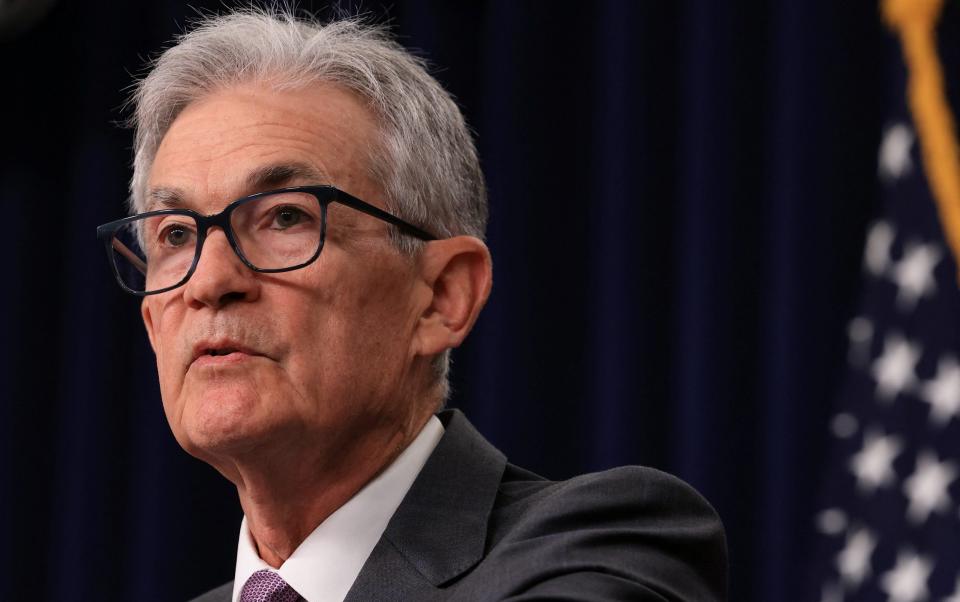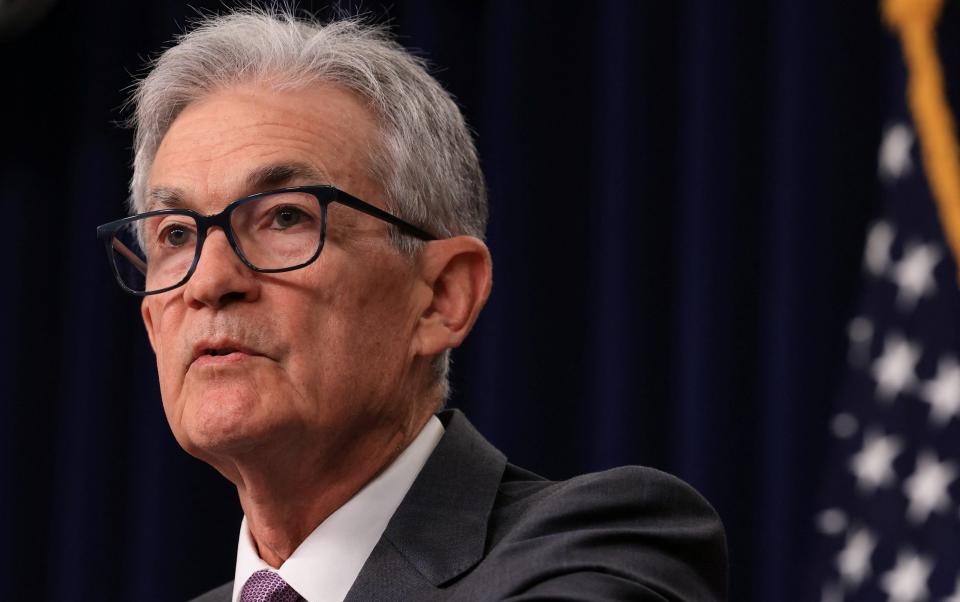
Jerome Powell, arguably the most powerful man in the world economy, has spooked global markets and triggered a sharp share sell-off around the world.
German, French and Italian markets were all down 1pc or more this morning and the FTSE 100 dropped as much as 0.7pc following a plunge of almost 6pc in Japan overnight – the second worst points drop on record for the country’s Nikkei index.
It suggests that a bubble of sorts is at risk of bursting. Supported by buoyant US consumers, a big-spending government and the dream of an AI-powered future, stock markets had surged from record high to record high this year.
Traders and investors had seemed confident that Mr Powell, the chairman of the Federal Reserve, could engineer that most elusive of economic phenomena: the soft landing.
That is market jargon for the ability to defuse a cost of living crisis painlessly, raising interest rates to crush inflation without casting the economy into recession.
But almost overnight, that confidence has evaporated.
US shares also plunged on Thursday night, led by tech stocks, and are set for another fall on Friday alongside a slide in European shares.
This run of bad economic data coincides with Powell’s decision to keep rates on hold at 5.5pc again at this week’s meeting of the Federal Open Market Committee.
Kiyoshi Ishigane, chief fund manager at Mitsubishi UFJ Asset Management, said: “I didn’t expect stocks to fall this much. This is probably because there are concerns that the US economy will collapse in a big way.”
Jobs crunch
The market turmoil was triggered by two key data points centred around jobs.
The first critical piece was a near one-year high in the number of Americans claiming unemployment benefits for the first time.
Initial jobless claims increased by 14,000 to 249,000 in the final week of July. This is the highest level since last August and slightly above expectations.
Oliver Allen at Pantheon Macroeconomics said this could be the start of a worrying trend.
“Standing back from the weekly noise, layoffs still appear to be on a renewed rising trend, as high borrowing costs force businesses to reduce costs and shelve expansion plans,” he said, noting a rise in layoff notice announcements in June to the highest level since December 2020, outside the collapse of logistics giant Yellow Corporation.
“Layoffs aren’t soaring, but their pick-up is happening alongside a decline in hiring, which will combine to depress growth in employment further over the coming months,” Mr Allen said. “In addition, the resulting rise in unemployment might gather momentum as firms notice improving labour availability and stop hoarding workers.”
The second vital number came from a closely-watched survey of manufacturers that showed activity shrank for a fourth straight month in July.
The shock centred around its barometer of jobs that suggested the current environment was the worst since the midst of the pandemic. The ISM manufacturing index, which mirrors UK PMIs, plunged to 43.4 in July, from 49.3 in June. Anything below 50 suggests a contraction.
“The plunge in the employment index will add to concerns that the Fed has left it too late to begin loosening policy,” said Thomas Ryan at Capital Economics.
“That will raise some eyebrows as it suggests there is a risk that the labour market softens beyond the normalisation we have already seen.”
Mr Ryan added that the “chances of a downward surprise in tomorrow’s nonfarm payrolls release” had now increased.
Powell wrongfooted
Matt Brizman of Hargreaves Lansdown said Powell may have left it too late to cut rates, and sustained high borrowing costs are suddenly biting hard.
“There are now concerns that the soft-landing scenario priced in for most of the year could be a pipe dream, and the Federal Reserve might have missed its chance to prevent an economic slowdown by not acting on rates earlier in the week,” he said.
“US jobs are out today, and further weakness here will simply exacerbate the current sell-off. Bad news is back to being simply bad news.”
This is a reference to a loss of confidence in the Fed. For a time, investors would cheer good news, pushing up share prices, and they would cheer bad news too because it raised the chance of a rate cut from the Fed, also pushing up share prices.
But that attitude has shifted.
Jim Reid at Deutsche Bank notes that financial markets now expect the Fed to slash rates by 1.75pc over the next year, “which is the sort of pace that we’ve only seen in a recession in recent cycles”.
All of that suggests financiers think Mr Powell has made a serious mistake by refusing to cut this week.
With his customary calm demeanour, the chairman confidently set out the case for the Fed to start cutting rates in the coming months.
“As the labour market has cooled and inflation has declined, the risks to achieving our employment and inflation goals continue to move into better balance,” Mr Powell said.
“The economy is moving closer to the point at which it would be appropriate to reduce our policy rate.”
Yet that point may be approaching rather faster than he anticipated.
Analysts expect US jobs data on Friday to show the world’s biggest economy added 175,000 jobs in July, down from 206,000 the previous month.
Mr Reid at Deutsche said there had “undoubtedly been a slowdown” in the jobs market since last year, with the three-month average now at 177,000, which is the weakest since January 2021. Unemployment is expected to remain at 4.1pc. Any major downside surprises could trigger a fresh sell-off.
Tech tumbles
At the same time the tech titans which have driven so much of the stock market boom of recent years are faltering.
Corporate data on Thursday showed sales of iPhones dropped to their lowest level in three years, hitting Apple’s shares. Amazon was pummelled by investors as it revealed forecasts for slowing sales growth. And chip-maker Intel announced cost-cutting plans as it reported a quarterly loss.
The political backdrop is also worrying markets, according to Jonas Galtermann at Capital Economics.
Donald Trump and other Republicans’ dim view of social media “could become a major headwind for big-tech stocks”, he said, while America’s rivalry with China, and the vulnerability of the Taiwan-heavy supply chain for chips, is another hazard to markets.
“This risk could materialise under either a Trump or a Harris presidency, but is perhaps somewhat more likely under the former given his more combative stance on trade policy and ambivalence around maintaining the US’ military commitments in Asia,” said Mr Galtermann.
A series of props supporting stock have been knocked away. To the confidence-driven world of finance, the Fed no longer looks like a safe pair of hands.
EMEA Tribune is not involved in this news article, it is taken from our partners and or from the News Agencies. Copyright and Credit go to the News Agencies, email news@emeatribune.com Follow our WhatsApp verified Channel





